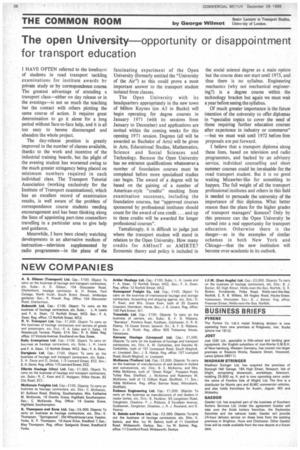The open University opportunity or disappointment for transport education
Page 40

If you've noticed an error in this article please click here to report it so we can fix it.
I HAVE OFTEN referred to the loneliness of students in road transport tackling examinations for institute awards by private study or by correspondence course. The greatest advantage of attending a transport class—either on day release or in the evenings—is not so much the teaching but the contact with others plotting the same course of action. It requires great determination to go it alone for a long period without face-to-face help, and it is all too easy to beome discouraged and abandon the whole project.
The day-release position is greatly improved in the number of classes available, thanks to the work and incentive of the industrial training boards, but the plight of the evening student has worsened owing to the much greater stringency being placed on minimum numbers required in each individual class. The Transport Tutorial Association (working exclusively for the Institute of Transport examinations), which has an excellent record of examination results, is well aware of the problem of correspondence course students needing encouragement and has been thinking along the lines of appointing part-time counsellors travelling in a particular area to give help and guidance.
Meanwhile, I have been closely watching developments in an alternative medium of instruction—television supplemented by radio programmes—in the plans of the fascinating experiment of the Open University (formerly entitled the "University of the Air") as this could prove a most important answer to the transport student isolated from classes.
The Open University with its headquarters appropriately in the new town of Milton Keynes (on A5 in Bucks) will begin operating for degree courses in January 1971 (with its sessions from January to December) and applications are invited within the coming weeks for this opening 1971 session. Degrees (all will be awarded as Bachelor of Arts) will be given in Arts, Educational Studies, Mathematics, Science and Social Sciences and Technology. Because the Open University has no entrance qualifications whatsoever a number of foundation courses must be completed before more specialized studies can begin. The award of a degree will be based on the gaining of a number of American-style "credits" resulting from examination successes, including the foundation courses, but "approved courses sponsored by professional institutes should count for the award of one credit ... and up to three credits will be awarded for longer professional courses".
Tantalizingly, it is difficult to judge just where the transport student will stand in relation to the Open University. How many credits for AMInstT or AMIRTE? Economic theory and policy is included in
the social science degree as a main option but the course does not start until 1973, and thus there is no syllabus. Engineering mechanics (why not mechanical engineering?) is a degree course within the technology bracket but again we must wait a year before seeing the syllabus.
Of much greater importance is the future intention of the university to offer diplomas in "specialist topics to cover the need of those requiring further education courses after experience in industry or commerce" —but we must wait until 1972 before firm proposals are put forward.
I believe that a transport diploma along these lines, based on television and radio programmes, and backed by an advisory service, individual counselling and short summer courses could be invaluable for the road transport student. But it is no good waiting Micawber-like for something to happen. The full weight of all the transport professional institutes and others in this field is needed to persuade the university of the importance of this diploma. What better reason than the plans for the higher grades of transport managers' licences? Only by this pressure can the Open University be turned into a real opportunity for transport education. Otherwise there is the danger—as in the examples of similar schemes in both New York and Chicago—that the new institution will become over-academic in its outlook.












































































